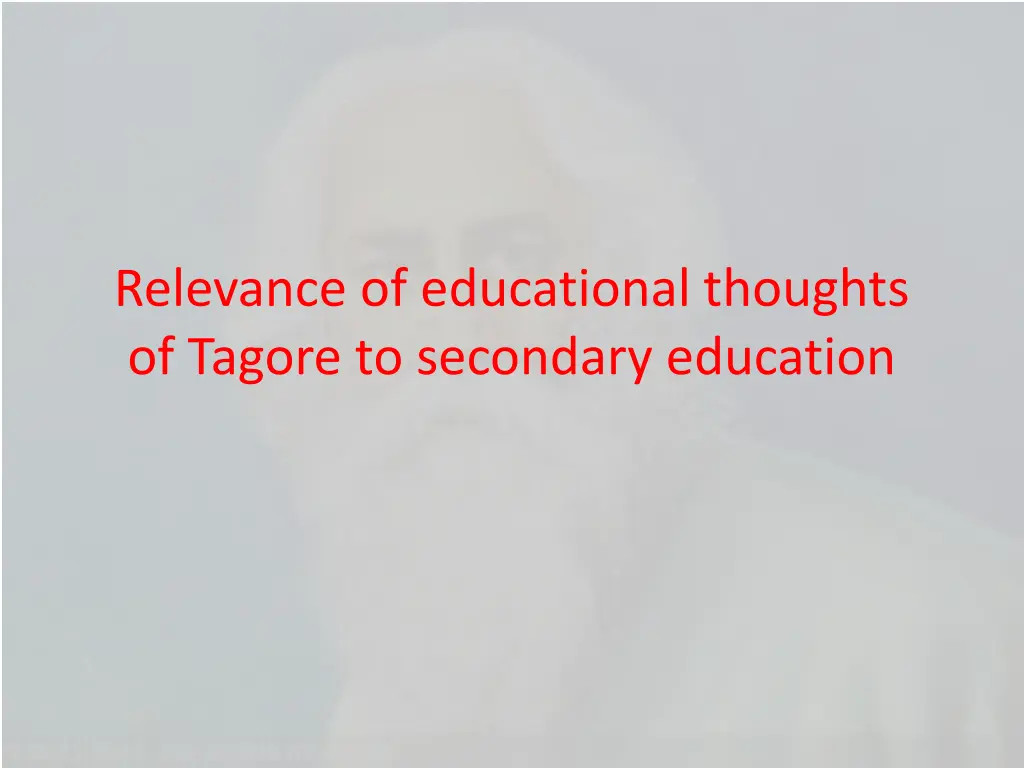
Tagore's Educational Philosophy in Secondary Education
Explore the educational thoughts of Tagore and their relevance to secondary education, focusing on goals such as unity of West and East, natural growth, freedom to learners, and practical teaching methods. Discover Tagore's emphasis on self-realization, intellectual development, and social freedom in education, reflecting his vision for a holistic approach to learning that encompasses mental, moral, spiritual, and physical development.
Download Presentation

Please find below an Image/Link to download the presentation.
The content on the website is provided AS IS for your information and personal use only. It may not be sold, licensed, or shared on other websites without obtaining consent from the author. If you encounter any issues during the download, it is possible that the publisher has removed the file from their server.
You are allowed to download the files provided on this website for personal or commercial use, subject to the condition that they are used lawfully. All files are the property of their respective owners.
The content on the website is provided AS IS for your information and personal use only. It may not be sold, licensed, or shared on other websites without obtaining consent from the author.
E N D
Presentation Transcript
Relevance of educational thoughts of Tagore to secondary education
Goals of Education Unity of West and East Natural growth in natural circumstance Goodbye to book-centered education Freedom to learner Teaching - practical and real Education for rural reconstruction Noushia Tabassuum M.ED(2015-17)
Aims of education Self Realisation Mother tongue as a medium of instruction Intellectual Development Aims Social Freedom Development Co-relation of object Noushia Tabassuum M.ED(2015-17)
http://t1.gstatic.com/images?q=tbn:rmeZPdjHU7q9JM:http://playmaniatampa.com/images/bluebox/playmania_index.jpghttp://t1.gstatic.com/images?q=tbn:rmeZPdjHU7q9JM:http://playmaniatampa.com/images/bluebox/playmania_index.jpg http://t1.gstatic.com/images?q=tbn:GWWlXXN9iK9G6M:http://www.mychildhealth.net/wp-content/uploads/2010/03/spirituality-children.jpg http://t3.gstatic.com/images?q=tbn:Ol13IAqbbj8o2M:http://www.crestock.com/images/1830000-1839999/1838925-xs.jpg See full size image Mental Development Acc to Tagore In comparison with bookish learning, knowing the real living directly is true education. It not only promotes the acquiring of some knowledge but develops the curiosity & faculty of learning and knowing so powerfully that no class room teaching can match it. Development of all faculties Chief aim of education should be the drawing out of the latent faculties of the child. To him a child is more important than himself problems hence he opposed the crushing of the child's individuality. Hence he should be given full freedom International Brotherhood Though Tagore was a individualist yet he believed in socialism, internalism. Acc to Tagore individual should develop to the fullest extent and then he should contribute his best to the promotion of international welfare Moral &Spiritual Development Education should strive for a number of moral and spiritual qualities like self discipline, tolerance, courtesy and inner freedom Physical development To include activities like swimming, diving, climbing trees, plucking flowers, etc. Noushia Tabassuum M.ED(2015-17)
Curriculum 1. Subjects: Literature and languages, Mother tongue, other Indian Languages and other foreign languages; Mathematics; Natural sciences such as Botany, zoology ,physics, chemistry, general science; health education; Social Sciences like geography, history, civics, economics, and Sociology; Agriculture and Technical Subjects; Arts, Music, Dance etc.; Philosophy; Psychology and Religion Noushia Tabassuum M.ED(2015-17)
2. Activities and Occupations: Dancing Dramatics Music Games and Sports Drawing and Painting Excursions Agriculture and Gardening Regional Study Laboratory work Social Service 3. Actual living and Community Service 4. Education through emotions through music, fine arts, painting, dance, dramatics and crafts 5. Education through mother-tongue but was not against of English language 6. Manual training for spiritual aspect found God in the labourer, the path-breaker and the tiller 7. Physical and Social Sciences real legacy is the cultural heritage of the whole community Noushia Tabassuum M.ED(2015-17)
Activity Method Discussion & Question Answer Teaching by Walking This method is of great importance because it activates all the faculties of the body & mind. In Vishwa Bharti, he made compulsory the learning of handicraft. He allowed any physical exercise or activity even during the class teaching Real education is based on real problems of life hence question- answer method is effective wherein the teacher put the questions & ask the students to participate in discussions. Thus they gain essential knowledge The mind in the class room does not remain active Hence by walking the mind remains active awake, hence the child easily grasp things Teaching by walking is the best method of education Noushia Tabassuum M.ED(2015-17)
Role of Teacher Tagore gave an important place to teachers and asked them to carry out the following activities:- 1. Believing in purity and in his own experiences, innocence of child, the teacher should behave with him with great love and affection, sympathy, affection. 2. Instead of emphasizing on book learning, the teacher should provide conducive environment to the child so that he engages himself in useful and constructive activities and learn by his own experiences. 3. The teacher should always be busy with motivating the creative capacities of the children so that they remain busy with constructive activities and experience. 4. Education can be successfully imparted by understanding childhood and giving oneself totally in love and union with it Noushia Tabassuum M.ED(2015-17)
